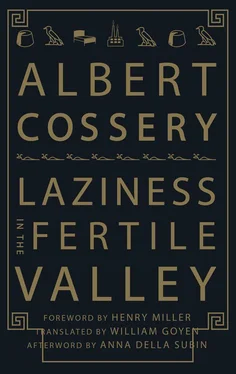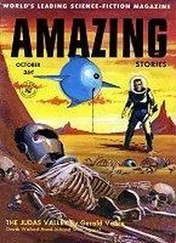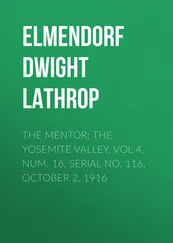Albert Cossery - Laziness in the Fertile Valley
Здесь есть возможность читать онлайн «Albert Cossery - Laziness in the Fertile Valley» весь текст электронной книги совершенно бесплатно (целиком полную версию без сокращений). В некоторых случаях можно слушать аудио, скачать через торрент в формате fb2 и присутствует краткое содержание. Год выпуска: 2013, Издательство: New Directions Publishing Corporation, Жанр: Современная проза, на английском языке. Описание произведения, (предисловие) а так же отзывы посетителей доступны на портале библиотеки ЛибКат.
- Название:Laziness in the Fertile Valley
- Автор:
- Издательство:New Directions Publishing Corporation
- Жанр:
- Год:2013
- ISBN:нет данных
- Рейтинг книги:3 / 5. Голосов: 1
-
Избранное:Добавить в избранное
- Отзывы:
-
Ваша оценка:
- 60
- 1
- 2
- 3
- 4
- 5
Laziness in the Fertile Valley: краткое содержание, описание и аннотация
Предлагаем к чтению аннотацию, описание, краткое содержание или предисловие (зависит от того, что написал сам автор книги «Laziness in the Fertile Valley»). Если вы не нашли необходимую информацию о книге — напишите в комментариях, мы постараемся отыскать её.
Laziness in the Fertile Valley — читать онлайн бесплатно полную книгу (весь текст) целиком
Ниже представлен текст книги, разбитый по страницам. Система сохранения места последней прочитанной страницы, позволяет с удобством читать онлайн бесплатно книгу «Laziness in the Fertile Valley», без необходимости каждый раз заново искать на чём Вы остановились. Поставьте закладку, и сможете в любой момент перейти на страницу, на которой закончили чтение.
Интервал:
Закладка:
Mimi calmed himself; he reprimanded his dog with a feigned brutality.
“Son of a bitch! I should kill you!”
“What astonishes me,” said Serag, “is the way you could immediately tell it was a female.”
“I can recognize that easily,” said Mimi. “The dirty animals; they’re rotten and full of fleas.”
“It’s still astonishing,” said Serag. “I can’t ever tell.”
They walked on a moment without talking; they were almost alone on the road. From time to time, Mimi turned and threw a furtive look behind. He seemed to be waiting for someone. He put his hand in his pocket and drew out a handful of watermelon seeds. He began to crack them one after the other with a sharp sound. The noise bothered Serag and kept him from dozing. He shook himself and looked around. A cab had just appeared on the road; it came toward them slowly, like a soft dream. It was driven by an enormous driver, who was whipping his horses with fury. In the cab, a huge woman was enthroned on the cushions — a woman of great importance, one would have judged by the monument of her loose flesh. The breeze raised her skirts, revealing her corpulent nudity with cruel lewdness. The two young men gasped.
“Horrible,” said Mimi. “Did you see!”
Serag didn’t reply; he had stopped in front of Abou Zeid’s shop. Mimi’s presence upset him; above all, he couldn’t bear his voice. Mimi had an insidious and caressing voice, like syrup. Serag felt caught and was aware of a strange sensation in his whole body. He would have liked to lie down by the side of the road to sleep awhile.
Mimi wasn’t paying any attention to him. He was possessed by a great exaltation. He became feverish and looked around uneasily every minute. Obviously, he was waiting for something. Suddenly, he seemed relieved at the sight of a man stopped near a tobacco shop. He was about forty, with curled moustaches and huge rings on his fingers. His tarboosh was tipped over his right ear and he carried a cane in his hand. He gave Mimi a conniving look, then lit a cigarette, puffing the smoke with an easy and innocent air. Mimi smiled at him, turned, and put his arm through Serag’s.
“You seem preoccupied,” he said. “Are you, by any chance, in love?”
“I’m not in love,” said Serag.
Mimi smiled and said ecstatically:
“All love! I couldn’t live without love.”
Serag didn’t answer him. After a minute Mimi said again:
“Tell me: how’s your brother Rafik?”
“He’s all right,” said Serag.
Mimi had been in the same class with Rafik and always favoured him. He loved his rude manners, the harsh sound of his voice, and his pallor of the sensual male. Unfortunately, Rafik had always met Mimi’s advances with a stiff and cold disdain. Mimi was profoundly wounded each time, yet his desire grew. He was almost completely happy when he could just see Rafik and delight in his presence. But since Rafik had resolved to stay in the house, Mimi had been left to the torments of the abandoned lover. Actually, his whole conversation with Serag had only been to hear some news about his brother.
“Why doesn’t he ever go out?” asked Mimi.
“He doesn’t like people,” said Serag. “He’d rather stay in the house.”
He hates me,” said Mimi. “I don’t know why. I like him very much.”
“I don’t think he hates you,” said Serag. “You’re wrong about that, I’m sure.”
“He hates me,” said Mimi. “Every time he sees me, and it’s scarcely ever now, he tries to avoid me. What have I done to make him hate me? Would you, my dear Serag, do me a favour?”
“With pleasure,” said Serag. “What is it?”
“Well, I’d like you to ask Rafik why he doesn’t like me. It’s very important to me. I’m so fond of him. Will you tell him?”
“I won’t forget,” said Serag.
Mimi turned and looked behind. The man with the moustaches and the large rings was following them slowly. Mimi came close to Serag and whispered in his ear:
“I’m terribly sorry, but I must leave you. I have to meet someone.”
In pronouncing these words, he seemed to confide a momentous secret to Serag.
“I’m very glad to have seen you,” he said again, before going away. “Goodbye.”
“Goodbye,” said Serag.
A group of wan children was standing in front of Abou Zeid’s shop; the neighborhood school had just let out for the afternoon. Some little boys and girls, their books under their arms, were buying things and pushing one another around. Abou Zeid was not waiting on them with his usual nonchalance; he seemed a bit frightened by his turbulent clientele. Serag waited until there was no one left, then he went up to Abou Zeid.
“Hello!” he said, “O illustrious merchant!”
“Ah! it’s you my son! By Allah! Spare me your sarcasms.”
Serag squatted near Abou Zeid and let sleep overcome him. Abou Zeid watched him sleep, and then he too closed his eyes. Behind them, the black beetles took possession of the empty shop.
VII
Old Hafez woke up with a start; he was shivering and bathed in cold sweat. He had just had a bad dream, an endless, terrible dream. He raised the handkerchief tied over his eyes with a feverish movement and shrank back under the covers fearfully. He tried to remember his dream, but it had become confused in his mind. He had only a vague, troubled memory that excited his senile sensuality. After a moment, he grew calmer and looked around. The room was plunged in half darkness, so that he had no idea what the time was. Old Hafez tried to discover the hour by some sign in the room. He glanced around, then stopped before a tray on the table. He’d eaten lunch. Therefore it must be afternoon, and he had just taken his siesta. He pulled off the handkerchief that still bound his forehead and protected him from the disturbing brightness of the day. He couldn’t sleep without it.
He sat up in bed and began to think. As usual, his reflections were simple and passionless. But for some time he had been prey to gnawing thoughts; a mute uneasiness was devouring
him. This marriage he had resolved upon, at the decline of his life, preoccupied him beyond all reason. It was the desire for renewed youth, and, at the same time, an act of authority. In his solitude, he had imagined this marriage as the last manifestation of his failing will. His unsociable spirit was always toying with all sorts of caprices whose essential aim was to contradict those around him. For some years he had not given an undeniable proof of his bad disposition; his family had begun to forget. Thus before dying, he wanted to leave some ineffaceable evidence of his tyrannical power.
For several days old Hafez had been waiting impatiently for Haga Zohra. She had promised to help him. She was a notorious go-between, and the allure of a profit made her extremely diligent. Old Hafez wasn’t worried about that; his worries were elsewhere. He paused in his reflections and listened to the silence of the house. No noise came from the first floor — everywhere the same silence. They must all be asleep. Old Hafez thought bitterly of his children. He hadn’t seen them for a long time; sometimes he managed not to see them for months. But through Uncle Mustapha he knew everything that was being plotted against him. Decidedly, they weren’t pleased with the idea of his marriage. He also knew Rafik was at the head of the revolt, that he’d sworn to kill Haga Zohra. He had given them too much freedom, and now they thought they could do anything. But he knew how to break them; he would show them he was still master.
Unfortunately, this struggle with his children was only a minor concern. Something else preoccupied him much more — a monstrous affliction. Old Hafez considered this affliction as the only serious obstacle to his marriage. He couldn’t even think of it without seeing his dream of a tardy union dissolve at once. He pulled back the covers, raised his nightgown, and examined his lower abdomen worriedly. An enormous hernia protruded like a mountain between his thin legs. It was really horrible. Each time old Hafez looked at his hernia, he was stupefied by its form. Every day it assumed fantastic shapes. Old Hafez was saddened when he uncovered it. He asked himself anxiously how he could dare present a young wife with such a calamity.
Читать дальшеИнтервал:
Закладка:
Похожие книги на «Laziness in the Fertile Valley»
Представляем Вашему вниманию похожие книги на «Laziness in the Fertile Valley» списком для выбора. Мы отобрали схожую по названию и смыслу литературу в надежде предоставить читателям больше вариантов отыскать новые, интересные, ещё непрочитанные произведения.
Обсуждение, отзывы о книге «Laziness in the Fertile Valley» и просто собственные мнения читателей. Оставьте ваши комментарии, напишите, что Вы думаете о произведении, его смысле или главных героях. Укажите что конкретно понравилось, а что нет, и почему Вы так считаете.












